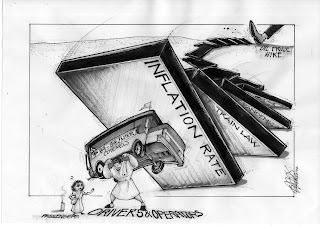COLUMN | Price hike like a drip, drip, drip that’ll never stop
Due to the intensified conflict in Russia and Ukraine, traders and financiers rejected oil and petroleum exports from Russia, the third largest oil producer in the world. Oil from Russia is gradually lost from the daily global market because of sanctions. The conflict between the two countries isn’t actually just between the two of them, but the global market because it poses threats for further sanctions and isolation of Russian oil if they continue to intensify the invasion.
This also left a devastating effect on the Philippines. The Department of Energy (DOE) continues to brace the public for next week’s oil price hike anew. This is due to Dubai crude oil’s price per barrel that fluctuated to almost $120 as of March 3一 surpassing the $80-mark. In an Inquirer report, oil firms have also announced a price hike which would bring diesel prices to P84 and P94 for gasoline.
More so, one of the fundamental concepts in the business world is supply and demand. The greater the demand, the faster it is to run out of supply and, in turn, a drastic increase in price.
The increase in oil prices affects people directly and indirectly. It double kills both the passengers and the drivers. Many workers prefer to commute or even walk, despite how far their office is since their budget is limited and they cannot afford any more expenses. In addition, jeepney drivers, bus operators, and public transportation owners are barely getting enough profit because their sales went to gas expenses. This has driven drivers to protest “Tigil Pasada”. There won’t be any point in going into business if drivers can’t gain from it or even support their family out of a wisp income.
On one hand, the oil price hike also has an indirect effect which prompts a spike in inflation because petroleum products are a significant input to almost all services, foods, and production. If the inflation continues to spurt, transportation won’t be the only one crippled, but as well as the food industry一wherein fast-food chains and carinderia goods increase their price. It is an added burden to everyone who’s barely surviving the pandemic and now the domino-effect of oil price hike to products and basic commodities is felt.
Given that the continuous demand of gas products is non-stop, the government should find a way to sustain people’s daily necessities. Although subsidizing the price of fuel will be helpful to drivers in need, it is only temporary. The continuous demand of petroleum products cannot be helped and the price will shoot up ceaselessly.
One way to address the problem is to invest in alternative sources of energy. Non-renewable sources, as identified by National Geographic, are fossil fuels such as coal, petroleum, and natural gas. It can easily run out, and will be hard to replenish, but the demand is going berserk. Renewable sources like water, sunlight, wind, and biomass are great alternatives because successful execution of them will lead to cleaner and more affordable sources of energy.
Only if the construction of Bataan Nuclear Power Plant (BNPP) met the safety standards, the Philippines could have enjoyed affordable energy. However, corruption controversies and the plant’s sitting made it impossible. The BNPP is situated near an earthquake fault line and is also 7.5 kilometers away from Mount Natib, a potentially active volcano. Aside from nuclear energy, solar plants are also proven to be cheaper than the traditional coal power plants. In terms of alternative fuels, the Philippines should look into Hydrogenated Vegetable Oil, biodiesel, and biogas as alternatives to suffice the rising demands and price of petroleum products.
The TRAIN Law even worsens people’s baggage because it imposes an excise tax on oil products which every year makes the price higher. This calls for the implementation and passing of the Bawas Presyo Bill by former Senator Bam Aquino. In this way, the excise tax on such products will be halted and the price will go down. It also gives ample time to people to adjust from financial devastation, otherwise, the pockets of Filipinos will continue to be empty. As of writing, Aquino reiterated in 2019 the call for its implementation, but was not approved despite turmoil and pleas of groups, including Vice President Leni Robredo.
The massive increase in oil product price might haven’t been felt by the bourgeoisie, but drivers and consumers are feeling emptiness in their pockets. Subsidies can’t compromise drivers permanently, and it can’t ensure that its citizens have access to basic needs. This is a wake-up call to the global market and nations to highlight alternative sources of energy, otherwise, the economy will eventually collapse and won’t recover from this slump. This also rings a bell to us to choose the right candidate who will invest in the long-term relation of the country and global oil production.
The amendment or complete-scrap of Oil Deregulation Law will prevent the government from controlling the rising price of petroleum products. It will also lower petroleum products’ prices. Filipinos shouldn’t shoulder the burden of rising oil prices because not everyone has recovered from the financial slump brought by the pandemic. A fast and efficient action from the government will at least compensate the ‘robbed’ pockets of Filipinos, especially drivers and consumers.

